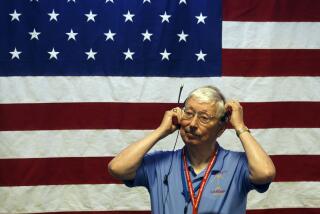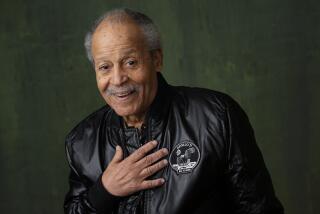Guenter Wendt dies at 86; storied overseer of early NASA space flights
John Glenn, the first American to orbit the Earth, dubbed Guenter Wendt “The Pad Fuehrer.”
Pete Conrad, the third man to walk on the moon, jokingly called him a “dictator.”
And Alan Shepard, the first American in space, presented Wendt with a prop German helmet from “Hogan’s Heroes” that was adorned with swastikas and labeled “Col. Guenter Klink.”
As pad leader for NASA contractors at Cape Canaveral, Fla., and at what became known as the Kennedy Space Center, the German-born Wendt was in charge of the White Room, the controlled environment at the top of the launch tower where astronauts prepare to enter the spacecraft.
He would be the last person the astronauts saw before their spacecraft hatch was closed.
“I was privileged to send them all off,” the heavily accented Wendt said in a 2002 interview with the Wichita Eagle.
Wendt, who was hospitalized last week for pneumonia and congestive heart failure and suffered a stroke while in the hospital, died Monday at his home in Merritt Island, Fla., said his daughter, Norma Wendt. He was 86.
The gregarious and gentlemanly Wendt is considered one of the legendary figures of America’s space program.
As an engineer with McDonnell Aircraft Corp., he began his association with the manned-space program when McDonnell won the contract to produce the Mercury spacecraft in 1959.
As the person responsible for all activity in and around the spacecraft and its attending ground support equipment, Wendt was involved in the Mercury, Gemini, Apollo and Skylab programs and the first few space shuttle launches.
“Basically, this guy was the first of a kind; there was nobody that did that job before he invented it,” said Robert Godwin, chief executive and managing editor of Apogee Books, which specializes in space publications and published Wendt’s 2001 book “The Unbroken Chain.”
Godwin said Wendt was responsible for creating the White Room environment for the Gemini program.
“He was the one who suggested it would make more sense to have a sort of controlled environment like that where they could service the spacecraft out of the elements because they had encountered so many problems with Mercury being exposed,” said Godwin, who edited Wendt’s book, which was co-written by Russell Still.
“His book was called ‘Unbroken Chain,’ and he thought of himself as just one link in the chain,” said Godwin. “But I think he was one of the strongest links in the chain.”
Wendt, Godwin said, had an obsession with safety.
“My job was to prepare the spacecraft and make it as safe as it could be,” Wendt said in the 2002 interview. “We didn’t have much time for chit-chat, for emotions.”
He said he and his crew had 145 procedures to perform during the two-hour prelaunch period, and there was no room for mistakes.
“Yes, I was a dictator,” Wendt told Florida Today in 2001. “At that time, we were working under very dangerous conditions. I didn’t have the time to form a committee or ask someone’s opinion or look it up in a book — I had to know. I had the strict obedience of my crew and they had confidence that I knew what the hell I was doing.”
When North American Aviation won the contract for the Apollo program in the mid-1960s, Wendt was asked to move from McDonnell to North American.
“He said he’d go, as long as he had the same authority,” said Godwin. “They didn’t want to give him that, and he declined.”
So Wendt was not present in January 1967 when a fire inside the Apollo 1 capsule killed Gus Grissom, Ed White and Roger Chaffee as they underwent a countdown test on the launch pad.
After the fire, Godwin said, astronauts Wally Schirra and Deke Slayton told North American they wanted Wendt back in charge of the White Room. Wendt agreed after North American assured him he’d have all the authority he needed.
When Apollo 7 was lifting off in 1968, astronaut Donn Eisele was heard wisecracking to the ground in an exaggerated German accent, “I vonder vere Guenter Vent?”
Despite his no-nonsense approach to his job, Wendt also was known for his practical jokes, including sewing up the sleeves to Conrad’s sports coat before a major news conference.
Wendt, who served on the investigation board that reviewed the 1986 Challenger explosion, retired in 1989.
He later served as a technical consultant on “From the Earth to the Moon,” the 1998 Emmy Award-winning HBO miniseries produced and hosted by Tom Hanks.
Born in Berlin on Aug. 28, 1923, Wendt served as a flight engineer in the German Luftwaffe during World War II. He came to the United States in 1949, sponsored by his father, who was then living in St. Louis.
Wendt initially worked as a truck mechanic. But soon after becoming a U.S. citizen in 1955, he was hired as an engineer at McDonald Aircraft.
In addition to his daughter Norma, he is survived by two other daughters, Irina Thompson and Sandra Taylor; as well as five grandchildren, one great-grandson and one great-great-grandson.
More to Read
Sign up for Essential California
The most important California stories and recommendations in your inbox every morning.
You may occasionally receive promotional content from the Los Angeles Times.










